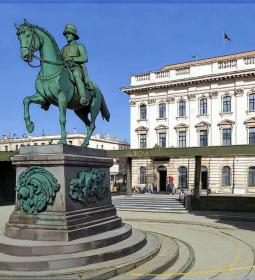Residents of Turkey profess the Muslim religion and follow strict life orders. The country is world famous for the fact that people and authorities in it adhere to strict morals and laws. You can get a fine here for things that are normal in other states. For example, a monetary punishment awaits a Turk or a traveler if he decides to swim in the sea or sunbathe on the beach without clothes. For more serious violations, they can be seriously fined or even imprisoned, because the local sacred foundations were insulted.
Before traveling to Turkey, a tourist should familiarize himself with the set of actions that should not be done during the holidays.
Insulting state and national symbols
Turkish citizens have great respect for their anthem, coats of arms, national flag and images of Mustafa Kemal Atatryuk – the "father of the people" of Turkey. His portraits are on local banknotes. If the police see someone trampling, crumpling, tearing, setting fire to or otherwise insulting these sacred objects, they will arrest the offender. For such actions, a local resident expects a prison sentence of 6 months to 3 years, and the traveler - deportation from the country and a ban on entry.
In the country, too, one should not argue with anyone about politics, religion, the actions of the president or the government. They will not be imprisoned for this, but the police can issue a verbal warning to anyone who is caught in such conversations on the street.

Photographing some objects
On the territory of Turkey there are structures, the shooting of which is strictly prohibited: the interiors of mosques, military, industrial and state buildings. Also, you can not photograph passers-by, if they have not given their consent to this. If a tourist takes these photos and catches the eye of the police or citizens who decide to complain about the traveler to the authorities, he may be asked to simply delete all the footage taken. If the caught refuses to erase the information, he will be taken to the police station and will receive a fine of several hundred liras.
Tearing off rare flowers
In the country there are rare and valuable plants that can not be plucked - these are mountain peonies and tulips of Manisa. If a guest of the country or a local resident falls for picking up rare plants, he can be fined a large amount: the offender will pay 60 thousand liras, which in terms of rubles is 200 thousand.
Export of relics outside the country
The history of Turkey is very rich and long, and for tens of centuries of its existence, unique monuments and relics have appeared on the territory of local lands, which are very much appreciated by local residents. True, these artifacts can simply lie under the feet of a traveler or be sold in the shops of local merchants along with other souvenirs.
If a tourist sees some kind of curiosity in the assortment of the merchant, you should not spend your money on it for two reasons. First, this artifact may turn out to be a useless fake with no value. And secondly, the country's authorities officially banned the export of historical values from the country - these can be items whose age does not exceed 50 years. However, even for the export of such a thing, a person can expect a severe punishment in the form of 12 years in prison. Historical artifacts can even include a piece of stone that fell off the local house!

Smoking and drinking alcohol in inappropriate places
On the territory of other countries, such actions are also banned and subject to a fine, only in Turkey the list of prohibited places is wider. If a traveler drinks alcohol without being on the territory of a hotel, bar, cafe or restaurant, he will be fined 200 lira. For smoking in the wrong places, a sanction of 65 liras awaits. By the way, smoking and drinking in the car is also prohibited, even if the car is personal.
Insulting people
People who are accustomed to letting off caustic words in relation to acquaintances or passers-by should abandon their habit while they are in Turkey. The country has a strict law prohibiting insults and scolding of other people. If the police receive a statement that a guest of the country or a local insulted the honor and dignity of someone, harassed or threatened, such a person can be imprisoned for up to 2 years. The punishment will be toughened if a person insulted people's religion or was drunk.










